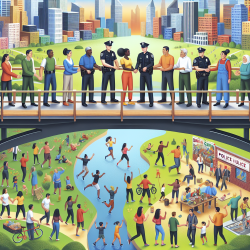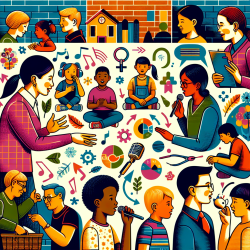Interactions with police are more than just law enforcement encounters; they can significantly impact an individual's physical, mental, and social well-being. A recent study titled "Community experiences with police and implications for public health: A focus group study" sheds light on these interactions and offers valuable insights for practitioners aiming to improve community-police relations.
The Study at a Glance
This qualitative study focused on individuals experiencing socioeconomic disadvantages in Edmonton, Canada. Participants were recruited from various community organizations and shared their experiences with the police through focus groups. The study identified key factors contributing to both satisfactory and unsatisfactory interactions with law enforcement.
Satisfactory Experiences
- Police Responsiveness: Quick and effective responses during emergencies were highly valued by participants.
- Police Compassion: Acts of kindness and understanding from officers left lasting positive impressions.
- Understanding of Police Work: Participants who understood the challenges of police work tended to have more respect for officers.
Unsatisfactory Experiences
- Discrimination: Experiences of racial profiling and ethnic discrimination were common among Indigenous participants.
- Use of Force: Instances of excessive force, particularly against intoxicated youth, were reported as negative experiences.
- Lack of Respect: Disrespectful treatment based on stigma associated with homelessness or mental health issues was frequently mentioned.
Implications for Practitioners
The findings highlight the need for ongoing training in sociocultural sensitivity and procedural justice for police officers. Practitioners can play a crucial role in advocating for these changes by working closely with law enforcement agencies to develop training programs that address these issues.
Key Recommendations
- Cultural Sensitivity Training: Regular training sessions should be conducted to ensure officers understand the diverse communities they serve.
- Community Engagement Initiatives: Police departments should actively engage with communities through outreach programs and information sessions.
- Improved Communication: Officers should be trained to communicate openly and respectfully, fostering trust within the community.
The study also suggests that police departments could benefit from integrating mental health professionals into their teams to better handle situations involving individuals with mental health issues. This approach not only improves outcomes but also reduces the burden on police officers who may not be equipped to manage such cases effectively.
The Path Forward
The relationship between policing and public health is complex but vital. By adopting a less discriminatory and more empathetic approach, police forces can significantly improve community relations and public health outcomes. Practitioners are encouraged to delve deeper into this research area to further understand the nuances of these interactions and develop strategies that promote positive change.
If you're interested in exploring this topic further, I highly recommend reading the original research paper: Community experiences with police and implications for public health: A focus group study.










